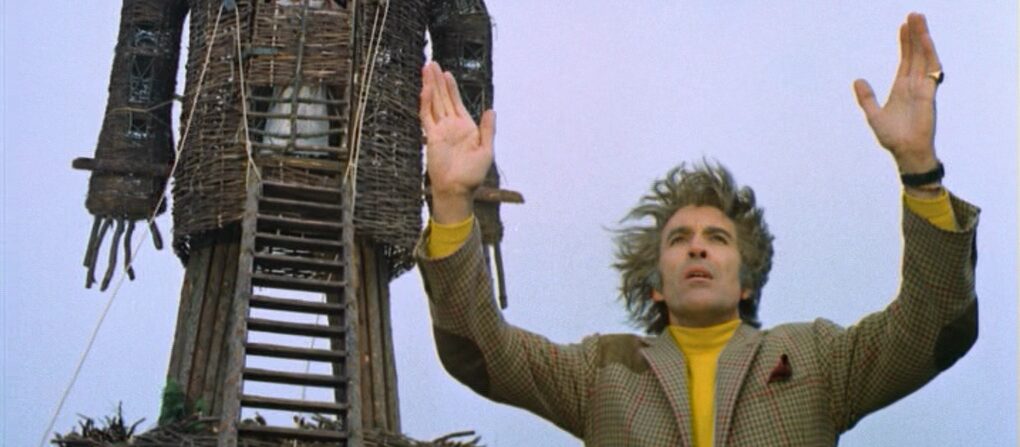
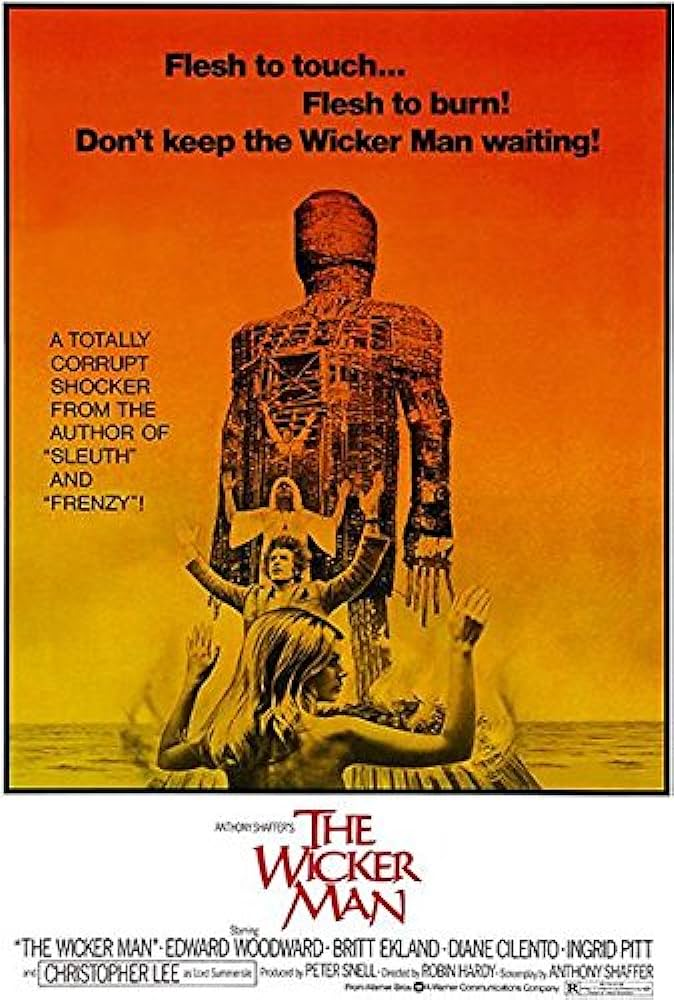
“Can I do anything for you, Sergeant?”
“I doubt it, seeing you’re all raving mad.”
Both of these things are true: Robin Hardy’s The Wicker Man is a bone-chilling horror film, and 90% of it barely suggests itself as a horror film. When Sergeant Howie (Edward Woodward) arrives on Summerisle to search for a missing girl, he’s quickly bombarded with bawdy drinking songs, pagan school lessons, slo-mo alfresco orgies, and a frenzied mating dance that can only be perceived in his mind’s eye. And yet many of these things happen in broad daylight. They appear as innocuous matters to everyone else on the island, and are often played as light amusement. I mean, heck, there are so many beautifully crafted diegetic folk songs (courtesy of Paul Giovanni) that it could quite easily be perceived as a musical—I’m not joking! The film’s mood and manner simply don’t match the gothic ambience of contemporary classics (The Exorcist, Suspiria), even acknowledging the presence of Hammer horror icon Christopher Lee. There are no vampires or serial killers, no haunted houses or dank castles. Until its final segment, the best one can come up with is a vague feeling of uncanniness that is achieved through colors, lighting, shot composition, and editing as much as through the residents’ casual adoption of arcane religious practices.
If the people of Summerisle are evil—and they most certainly are—they don’t perceive themselves that way. That is the key to understanding the film: it unfolds in a world operating by a ruleset entirely different from our own. It’s a world in which the old gods have clawed back a forgotten hunk of cosmic real estate from Yahweh and now hold its inhabitants under their influence. A world without the same metaphysical truths that undergird the social morality of the modern world; without a commitment to the Judeo-Christian worldview, whether implicitly or explicitly. To wit, for the residents of Summerisle, human sacrifice is not only not evil, it’s actually good. They believe in spiritual reincarnation in nature, not bodily resurrection or a mere cessation of being. Like in the old Traffic song ‘John Barleycorn Must Die’, where the subject dies and is reborn as bread and whiskey, so they believe that the deceased will be born again as the fruits of their fields. Even though they try to draw parallels—the missing girl supposedly turns into a hare just as Christ is in the Eucharist; the young ladies practice rituals that they might be impregnated without sexual union like the Virgin Mary—it is clear their conception of reality is aberrant.
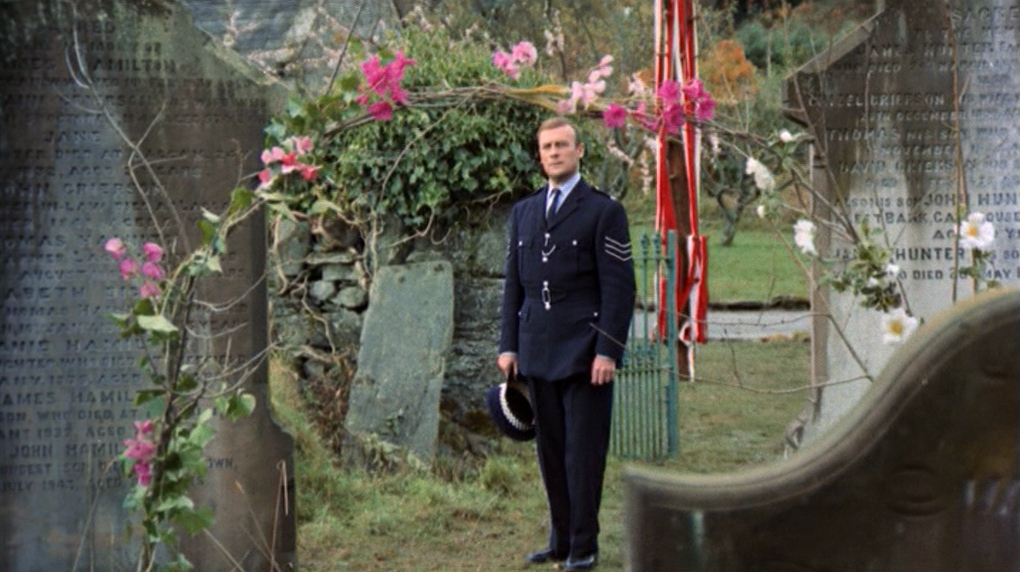
Howie, a priggish, puritanical Christian with more than a hint of bigotry, wanders into this pantheistic realm totally unaware of the new context. He is flabbergasted to see hobby horses, corn dollies, fertility rites, and dances around the phallic maypole—echoes of a pre-Christian Europe rematerialized in earnest before his very eyes, juxtaposed with markers of modernity like pin-up posters and high-top sneakers. He cannot fathom why all of the islanders speak of the missing girl (Geraldine Cowper), soon discovered to be dead (and later, alive again), in such a casual manner. But it is when he finally speaks with Lord Summerisle (Lee), a cross between a charismatic ex-hippie and a druid, who calmly states that the true God, “to whose glory churches and monasteries have been built on these islands for generations past,” blew his chance and is “dead,” that the detective realizes he is in a thoroughly anti-Christian milieu and that his investigation might have a spiritual aspect.
The filmmakers bring these disparate worldviews into conflict in an early scene in which Willow (Britt Ekland) tempts Howie with an erotic song-and-dance that he senses through his hotel wall. “How a maid can milk a bull,” she sings. “And every stroke a bucketful.” This is not merely an attempt to sway Howie to the pagan way of life, an attack on his purity, but also a test of his worthiness as a sacrifice to the god of the harvest—the ultimate fate they have planned for their Christian visitor. This spiritual tension holds until the resonant climax, where Howie dies a so-called martyr’s death within the flaming statue while the pagans sing joyous chants from the mountainside. In the end, both Howie the stern Christian and Summerisle the proud pagan live out their religious beliefs with conviction—and neither loses, according to those beliefs. Of course, we don’t actually see Howie’s death result in a bountiful harvest; it remains a distinct possibility that Summerisle is just using folk religion to exert control over his serfs.
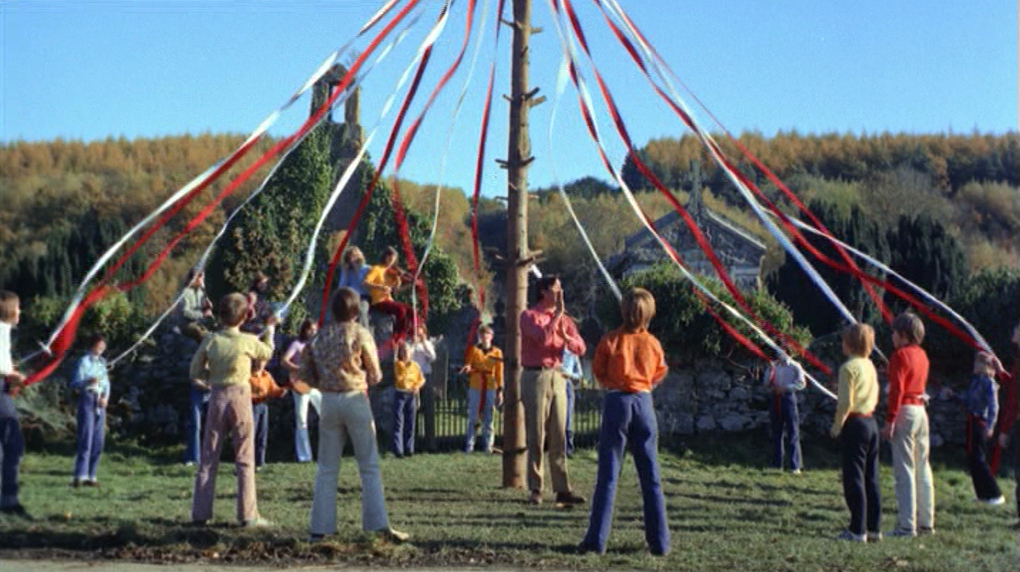
The horror, then, is derived from transgressions against a reality that the insular people of Summerisle simply do not know, because the religious tenets and social norms they’ve grown up with are very different. These experiences are not universally horrifying, such as an encounter with a demon or what have you; but they are horrifying to someone who is conditioned to hold certain virtues in high regard—even as sacred—and then sees those virtues substituted with depravity.
All of this makes The Wicker Man an incredibly unique horror film, in that everyone except the protagonist sees these deviant and occult acts as commonplace, and it’s only near the end that he detects their sinister intentions. Even so, the whole thing turns on the finale, where all of the preceding chicanery and trolling could be brushed off as an elaborate joke and all the subtle menace laughed off, or else reveal a viciously cruel trap. It’s at that late stage, when the pagans, led by Christopher Lee in drag, link arms and sing a silly hymn to their god while their fellow man burns to death in the bowels of the Wicker Man, that their casual inhumanity becomes fully evident and utterly horrifying. Now we can no longer secretly thrill at Howie being taken to task for his stuffy religiosity by a group of clannish cultists. We can no longer savor this untamed, marginalized community wreaking havoc on this symbol of order and authority and tradition. (It is strange to me how adults dressing up as animals and clowns is either playful or nefarious, with few obvious exceptions, one being that cringy neopagan LARPers sometimes do stuff like this half-ironically today. The dress-up stuff, I mean. I’m not sure if they actually make human sacrifices. But if they did, they’d probably do it half-ironically.)
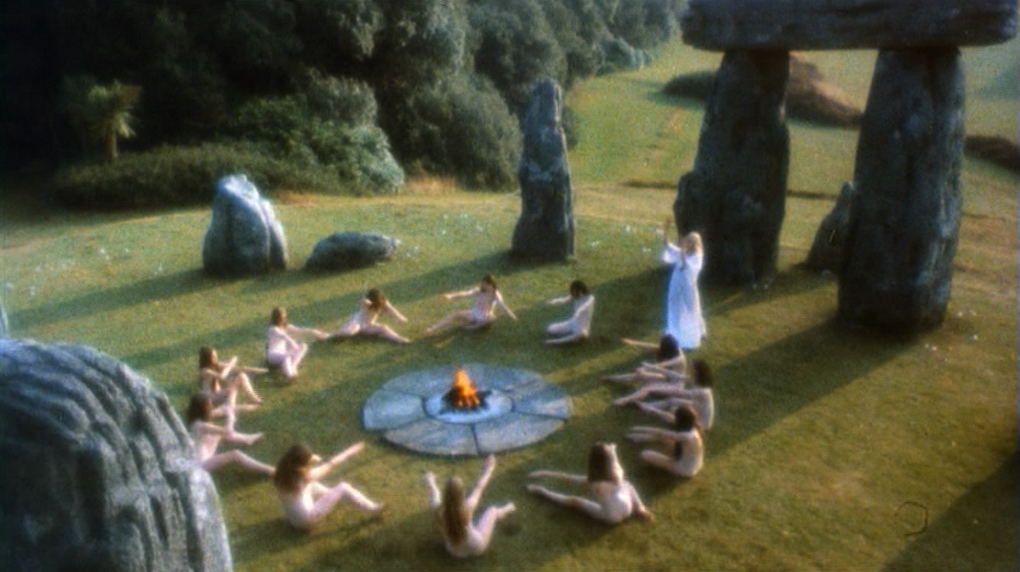
Critics are divided on the film’s moral/theological stance, or if it even has one. If I had to lay my money down I’d say it sides with Christianity, because, while it does paint Howie as a bit of a sanctimonious prude and hardly a hero for Christ, he is depicted as falling short of his religious ideals. However, even as Hardy and writer Anthony Shaffer (who also wrote Alfred Hitchcock’s Frenzy and Joseph L. Mankiewicz’s Sleuth) present elements of paganism as festive and cheerful, even a little kitschy, its practitioners are paragons of their religion—happy and carefree, sure, we all want that, but also totally nonplussed with the ritual sacrifice of a stranger that they intentionally selected based precisely on his Christian virtue. In other words, their very act of selecting a sacrificial victim who abides by eternal, unchanging truths implicitly acknowledges their own perversion of those truths. This is not a “fake religion,” as Howie initially perceives it, but a very real, very wicked one, with no conception of transcendence or eternity. The apparent lack of malice from the villagers can only indicate a total moral departure—a transgression of reality itself. On the other side of the coin, Howie, despite his human flaws, is willing to forge ahead with his investigation even once he perceives the grave dangers awaiting him in the hope that he might rescue a total stranger who very likely believes the same vile distortions. When we finally glimpse the towering effigy, we are confronted with the raw terror of this barbaric practice and made to question the proper role of genuine religion—our hearts and minds engaged with this bleak, beautiful spectacle.
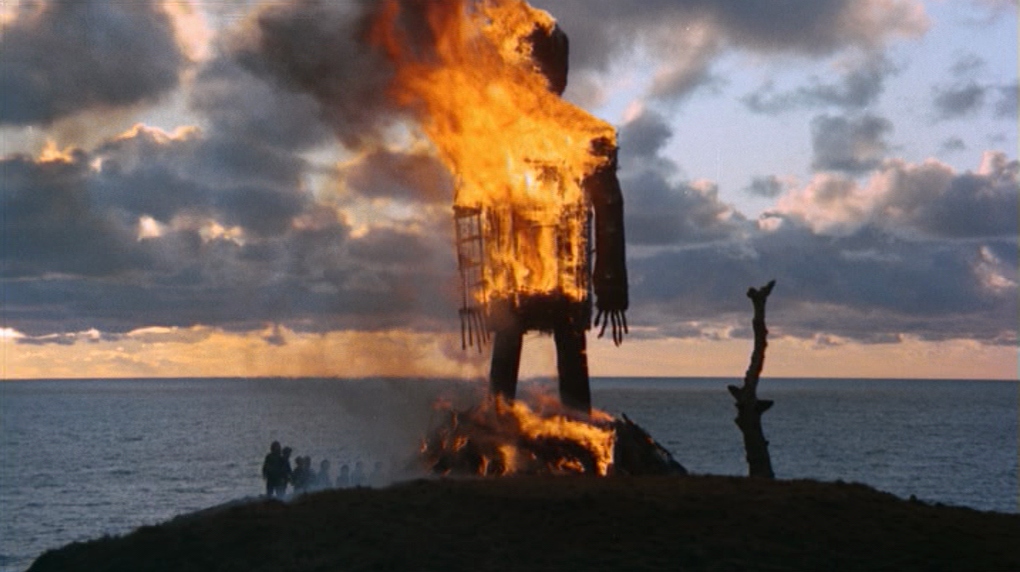
The film wisely elects to not resolve this for us. As the flames begin to close in around Howie, he sings a hymn and cries out to God for mercy, that he might not endure the fires of Hell despite bearing within himself unconfessed sins, but might partake of the life eternal promised by Jesus Christ. Indeed, it is at this late moment that Howie finally realizes a concern for his own spiritual condition; after ridiculing the degenerate practices of the people of Summerisle for the duration of the film, he comprehends that his own ducks aren’t all in a row, either. Where he had previously wielded his religion as a tool for asserting his superiority over the heathens on the island, he now retreats to it as a source of peace and comfort as he faces certain death. Meanwhile, his murderers sing an invocation to their regional gods—creating a horrid cacophony as it mixes with the screams of the dying animals they’ve lit ablaze alongside Howie—entreating them to reward their sacrifice with a fruitful harvest. It is a hideous, potent juxtaposition, made even more grotesque by the symbolic association of Howie’s sacrifice for a productive growing season with Christ’s death and resurrection for the redemption of mankind.
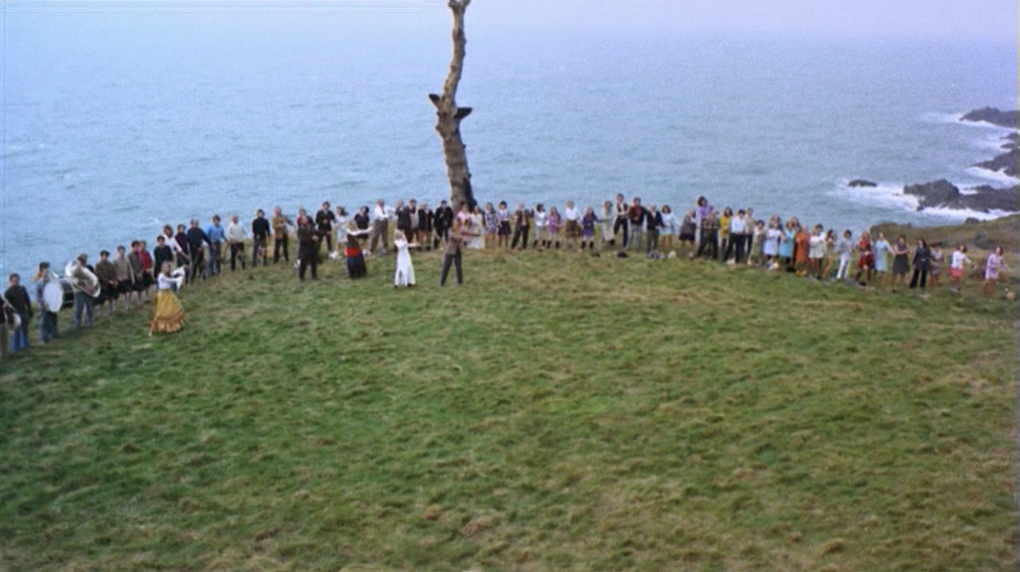
Side note: several analyses I have read state that in his final moments, Howie shouts “Damn you!” at the pagans, and use that reading to suggest that Howie has forsaken his beliefs (Christ himself and Saint Stephen asked for forgiveness for those who killed them). However, “Damn you!” is both out of character and hard to discern when listening to the audio. I believe that he either cries “Jesus,” as Joan of Arc did as she was burned at the stake, or “Daniel,” in reference to the fiery ordeal of Shadrach, Meshach, and Abednego from the third chapter of the Book of Daniel. And anyway, isn’t Howie’s parting suggestion to sacrifice Lord Summerisle the next time the crops fail a sufficient curse?
Ultimately, the film’s allegiance is neither naïve nor triumphant, nor is it precisely to Christianity, per se, but rather to the notion of transcendent metaphysical truths that tie the universe and specifically mankind together, and which can be transgressed only at the risk of great spiritual peril. That these challenging questions are subtly raised within the context of a sedate, genial, and ultimately terrifying mystery that emphatically works on a gut level elevates the Wicker Man to the apex of cinema—horror, musical, religious, camp, or otherwise.